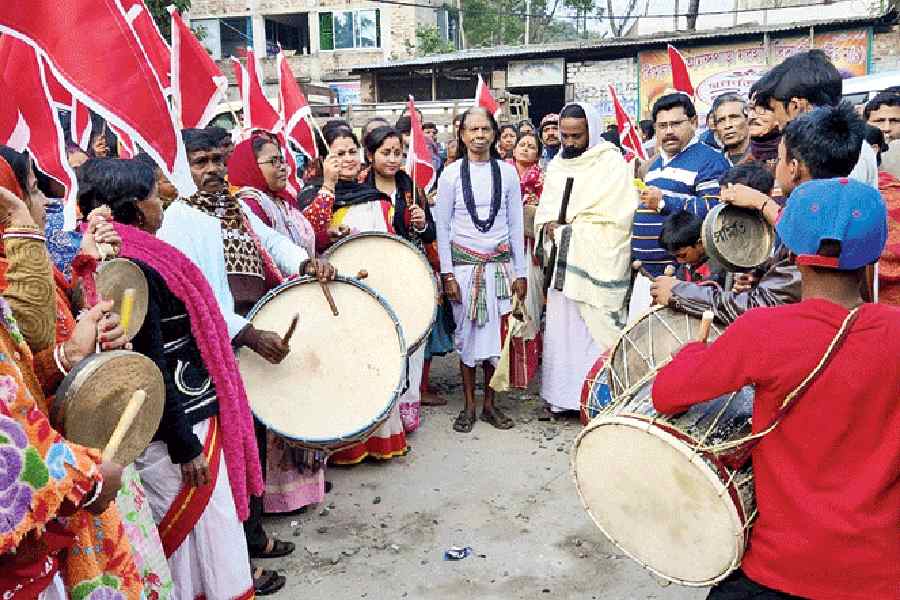West Bengal's Matua community on Monday celebrated the implementation of the Citizenship (Amendment) Act (CAA) 2019 at the headquarters of the sect at Thakurnagar in North 24 Parganas district, claiming it to be their “second independence day”.
Matuas, originally from East Pakistan, are a weaker section of Hindus who migrated to India during the Partition and after the creation of Bangladesh.
The community, with an estimated population of three million in the state, can tilt the scales in favour of a political party in more than 30 assembly seats in Nadia, and North and South 24 Parganas districts bordering Bangladesh.
While union minister and BJP leader Shantanu Thakur said all refugees who had to leave their homes due to religious persecution will become full-fledged citizens of India, TMC leader Mamatabala Thakur wondered if the Matuas need to provide proof of their citizenship again.
Both Shantanu Thakur and former TMC MP Mamatabala Thakur belong to the Matua community.
State Congress president Adhir Ranjan Chowdhury claimed that it is a ploy of the BJP to get Hindu votes in the upcoming Lok Sabha elections and wondered how people would produce proof documents of religious persecution.
West Bengal Chief Minister Mamata Banerjee said she would fiercely oppose the CAA if she found it to be discriminatory against groups of people living in India and if it curtailed their existing citizenship rights in any manner.
She asked, “Why do this only days before the Lok Sabha polls are scheduled to be announced? Why did the Centre have to wait for four years to notify the law after it was passed in Parliament? Members of the Matua community celebrated the occasion by beating drums and exchanging pleasantries and expressed their gratitude towards Prime Minister Narendra Modi, Union Home Minister Amit Shah, and local MP and Union minister Santanu Thakur for the Act's implementation.
Prime Minister Narendra Modi had visited Orakandi in present-day Bangladesh, the birthplace of Matua gurus Harichand Thakur and Guruchand Thakur in 2021, ahead of the West Bengal assembly elections.
The Matuas hailed the moment as a defining one for them, expressing joy at finally being granted citizenship. They referred to it as their "second independence day".
However, a TMC supporter from the area, belonging to the sect, claimed that people of the community had previously obtained voter ID cards, ration cards, and Aadhaar cards, which were deactivated by the BJP a month ago.
Thanking the prime minister for "realizing the dream of three generations of Matuas", Santanu Thakur said that due to "political conspiracies in the past”, many of the Matuas had to stay back in East Pakistan as there was no act like CAA to recognise their right to live in India.
“From today, not only every Matua but also other refugees, who had to leave their homes due to religious persecution, will become full-fledged citizens of the country," he told a press meet at the BJP state headquarters here.
Earlier, the Matuas and other refugees needed certain pre-1971 land documents for getting passports, the minister said adding that the CAA has made those norms a thing of the past.
His relative and former TMC MP Mamatabala Thakur told reporters: "It is all aimed at getting votes. What about the citizenship rights already granted to Matuas after 1947? Will the CAA force them to come up with identity proofs once again and throw them into an uncertain future?" State Congress chief Adhir Ranjan Chowdhury said, “This is nothing but a ploy to get Hindu votes in the Lok Sabha elections. Otherwise, why did it take years to notify the rules? The refugees need to produce copies of complaints lodged in connection with religious persecution. How will it be possible for them to produce such documents?” Union minister Nisith Pramanik told reporters that this legislation will help everyone who was forced to leave their homes due to religious reasons before 2014 and make them entitled to get Indian citizenship.
"The CAA will not persecute any single individual who had to settle here. The opponents are misleading people," Pramanik said.
Leader of Opposition Suvendu Adhikari thanked the prime minister for notifying the rules of the CAA.
“The long-standing demand of the Matua Community will now be fulfilled and they will get Citizenship and no one can deny them their rights, not even Mamata Banerjee,” he said in a post on X.
The CAA was implemented for granting citizenship to undocumented non-Muslim migrants from Pakistan, Bangladesh and Afghanistan who came to India before December 31, 2014.
With the CAA rules being issued, the Modi government will now start granting Indian nationality to persecuted non-Muslim migrants -- Hindus, Sikhs, Jains, Buddhists, Parsis and Christians -- from the three countries.
The CAA was passed in December 2019 and subsequently got the president's assent but there were protests in several parts of the country against it. The law could not come into effect as rules had not been notified till now.
Except for the headline, this story has not been edited by The Telegraph Online staff and has been published from a syndicated feed.











